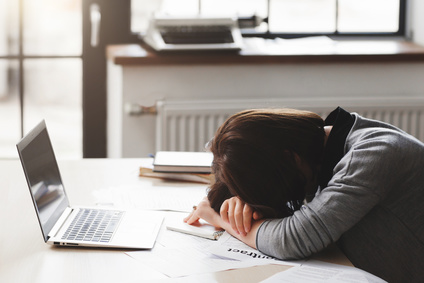📚Overcoming Sleep Deprivation: How To Eliminate the Cause
 Sleep serves an essential purpose as it allows our body and mind to rejuvenate from the day’s activities and primes us for what’s next. At one point or another, most of us will face the challenge of overcoming sleep deprivation. Once you’re caught in its cycle, finding a way out can prove to be a difficult journey.
Sleep serves an essential purpose as it allows our body and mind to rejuvenate from the day’s activities and primes us for what’s next. At one point or another, most of us will face the challenge of overcoming sleep deprivation. Once you’re caught in its cycle, finding a way out can prove to be a difficult journey.
In this article we will take a look at the reasons for why we sleep, what happens when we don’t get enough, and ways you can improve your sleep habits to prevent yourself from exhibiting sleep debt symptoms.
Why Do We Need To Sleep?
Sleeping is vital to keeping fit and healthy, but why does lying down and becoming unconscious help with this? It all comes down to the processes that occur during this time, particularly the ones that can’t happen when you are awake.
During the day, when you are doing things, your body needs to be fully prepared for all eventualities. Your muscles are constantly working (even if you are simply sitting at a desk for long periods of time) and your brain is always alert and processing huge amounts of data it receives from your senses. Sleeping is the time when all of this can take a break and the body can focus on healing itself and organizing all of the information it has gathered.
Why Do We Feel Sleepy?
Your brain knows that you need regular sleep for a number of reasons, so it takes steps to encourage you to go to sleep when you’ve been up for long enough. This process takes place by the release of adenosine, which is a chemical that causes the sleepy feeling and helps the brain transition to the level of activity needed at nighttime.
Levels of adenosine start to accumulate in the brain as soon as you are awake, and when the concentrations get to certain levels, you will start to yawn and feel like it’s time for a nap. Stimulants, such as caffeine in coffee, counteract the effect of adenosine so you don’t feel tired, but it’s important to realize that this simply covers up the symptom, and does nothing to actually deal with the fact that your body needs rest. The only way to truly satisfy that need is by going to sleep.
What Happens During Sleep?
While you are asleep you pass through varying sleep stages, each of which relate to specific processes that are going on in your body. Stage 1 sleep is the lightest stage when you can be easily woken up again. It’s basically when your body prepares itself for the deeper stages of sleep.
Stage 2 is when your eyes stop moving and there are only occasional bursts of activity in your brain- your temperature falls and your heart beat slows down.
Stage 3 is the deepest sleep and is when your body restores itself. At this stage human growth hormone is released and your muscles heal themselves in preparation for the following day. The deep sleep stage is also where the levels of adenosine in your brain are reduced, so the compulsion to feel sleepy goes away. This is why short naps rarely deal with the overall sense of fatigue, because they don’t give you enough time in a deep sleep phase to counter the effects.
The final stage of sleep, REM sleep, is when there is the most brain activity, similar to that seen when you are awake, and is thought to be when the brain processes all of the information it has gathered.
When you are asleep you will transition between each of these stages a number of times, so when you wake up you should be feeling fresh and energized for the day ahead.
The Ideal Amount Of Sleep
Ideally you should be getting at least 8 hours of sleep per night. If it is less or more than that then you may start to experience some sleep related symptoms. The body works best when it keeps to a regular routine, so you should try to be going to sleep and waking up at the same time each day- even at weekends.
What Happens If You Don’t Sleep Enough?
If you don’t get enough sleep, or the sleep you do get is interrupted so you aren’t able to spend enough time in each stage, you will start to exhibit signs of sleep deprivation. There are a number of symptoms you may experience, both physiological and neurological:
- Memory problems and confusion
- Sore muscles
- Headaches
- Irritability
- Excessive yawning
- Your skin clams up
- Eyesight problems
- You get sick more often
- It’s hard to keep your emotions in check
- Hallucinations
- Bags under your eyes
- Tremors
- Increased risk of diabetes
- Increased risk of depression
- A raise in blood pressure
- Sudden weight gain/loss
It can be quite worrying if you notice any of these happening, as they are intrusive in you life and will majorly affect your ability with day to day tasks. In severe cases you may even find yourself starting to micro sleep where you doze off for short amounts of time during the day without even necessarily noticing it.
What Is Sleep Debt?
Sleep debt, often referred to as a sleep deficit, occurs as the result of not getting enough sleep over time. If you miss part of your sleep one night, or the whole thing entirely, then your body will need to make up for this in the future. It can, therefore, build up slowly over a number of days or weeks if you aren’t properly sleeping, or it can become an instant effect if you have a day or two with very little sleep at all.
How To Recover From Sleep Deprivation
The most important thing to do is figure out the reasons causing you to not get enough sleep in the first place. Of course this could be something as simple as a crazy work regime in the past few days or weeks, and your sleep deprivation timeline could only be a short one-time occurrence, but it could be related to your sleeping environment, overall sense of mental wellbeing, or a behavioral cause.
Eliminate The Potential Cause
As said before, the ideal amount of time you should be sleeping each day is eight hours. This should also be at the same time each day to allow your body to adapt to a regular routine. Sleeping in the right environment is also important, so you should reduce the number of distractions like lights and sounds, and ensure that you have a really comfortable bed that provides ample cushioning and keeps you at a good temperature.
Stimulants before bed are a bad idea, so you shouldn’t be having coffee, smoking, or drinking alcohol within the hours before you go to sleep- nor should you be eating large meals (although smaller snacks are fine).
One new problem that has arisen with modern technology is people’s use of smartphones or tablets before bed, which emit blue light that excites certain parts of the brain. Particularly if you are having trouble sleeping, you should aim to keep use of these devices to a minimum within the hour before you go to bed, and if they are in the room with you make sure they are face down so they aren’t shining the light into the room.
Stress and anxiety will also affect how effective your sleep is, but these can be a bit more tricky to deal with quickly. It should, though, be a long-term goal to reduce these factors.
What To Do If It’s More Serious
Recovering from sleep debt can take quite a while to fully happen. The only way to do it is by getting more sleep and making up for what has been lost out on. It won’t resolve itself instantly after one night, especially if you haven’t been getting enough sleep for a number of weeks or months, so you should be prepared for it to be a gradual process over a few weeks.
Start off at the weekend by going to bed at the regular time, but not setting an alarm and letting yourself sleep until you wake up. This may mean that you are asleep for 10 or 11 hours, but that’s absolutely fine. After a while of doing this you will start to wake up after less time as your body makes up for the lack of sleep, and you will soon be back to normal again.
The Final Word
With modern lifestyles and work commitments it can be difficult to ensure that you get enough sleep every night, but this soon stacks up and can become a problem. Once you start experiencing the symptoms of sleep debt they can affect your day to day life. Luckily, overcoming sleep deprivation is easy enough to do, but be ready for it to possibly take a few weeks before you feel fully recovered.






